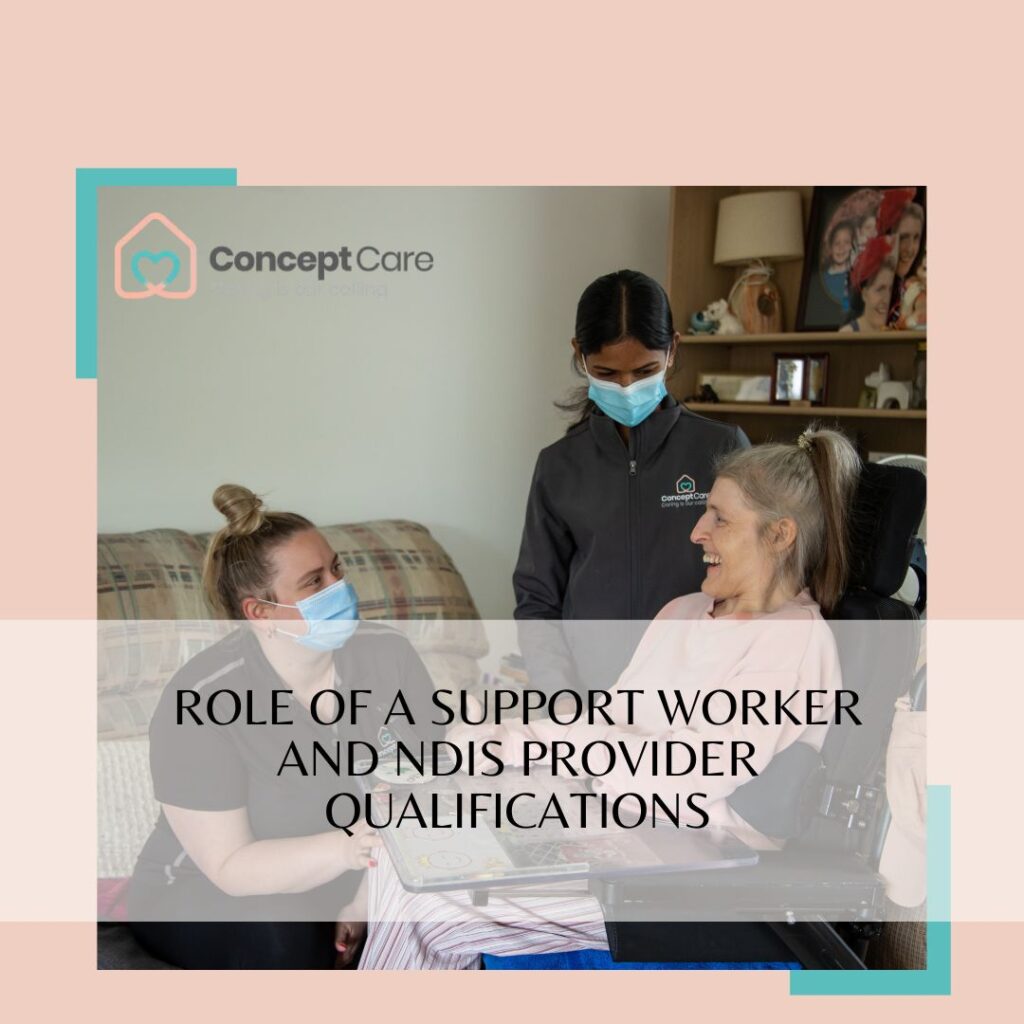Understanding the Role of a Support Worker and NDIS Provider Qualifications

Understanding the Role of a Support Worker and NDIS Provider Qualifications Understanding the Role of a Support Worker and NDIS Provider Qualifications June 24, 2024 In the realm of disability support, the role of a disability support worker is both critical and compassionate. As the National Disability Insurance Scheme (NDIS) continues to evolve in Australia, the demand for skilled and empathetic disability support workers is on the rise. In this blog post, we’ll delve into what it means to be a disability support worker, the qualifications needed to become an NDIS provider, and the requirements to excel in this rewarding field. What is a Support Worker? A support worker, often referred to as a disability support worker, provides assistance and care to individuals with disabilities to help them lead fulfilling and independent lives. Their duties can vary widely depending on the needs of the individual they support. These may include personal care, household chores, transportation, social activities, and even emotional support. The role of a support worker is not just about completing tasks; it’s about building meaningful relationships, fostering independence, and advocating for the rights and well-being of people with disabilities. Support workers often work closely with clients, their families, and other healthcare professionals to ensure that their needs are met comprehensively. Qualifications to Become an NDIS Provider To become a registered NDIS provider, there are certain qualifications and criteria that need to be met. While the specific requirements may vary depending on the type of service you wish to provide, there are some general steps to becoming an NDIS provider: Registration: Providers must register with the NDIS Quality and Safeguards Commission, which oversees the quality and safety of NDIS services. Compliance: Providers must comply with the NDIS Practice Standards, which outline the expectations for quality and safety in service delivery. Training and Qualifications: Depending on the services you offer, you may need specific qualifications or training. For example, if you provide personal care or nursing services, you may need relevant qualifications in healthcare or disability support. Police Checks and Working with Children Checks: Providers and their staff must undergo police checks and working with children checks to ensure they are suitable to work with vulnerable populations. Business Registration: If you’re operating as a business, you’ll need to register your business and ensure compliance with relevant laws and regulations. Insurance: Providers must have appropriate insurance coverage, including professional indemnity and public liability insurance. NDIS Support Worker Requirements While there are no formal qualifications required to work as an NDIS support worker, having relevant skills, experience, and attributes is essential. Some of the qualities that make a great support worker include: Empathy and Compassion: The ability to understand and empathize with the challenges faced by people with disabilities is crucial for providing effective support. Communication Skills: Good communication skills are essential for building rapport with clients, understanding their needs, and effectively communicating with other healthcare professionals and family members. Patience and Flexibility: Supporting individuals with disabilities often requires patience and flexibility, as every person’s needs and preferences are unique. Problem-Solving Skills: Support workers need to be able to think on their feet and find creative solutions to challenges that may arise in the course of their work. Respect for Dignity and Autonomy: Respecting the dignity and autonomy of individuals with disabilities is paramount. Support workers should empower their clients to make their own choices and decisions whenever possible. Conclusion Being a disability support worker in the NDIS sector is both a privilege and a responsibility. At Concept Care, we believe that it requires a combination of qualifications, skills, and personal attributes to excel in this role and make a meaningful difference in the lives of those you support. By understanding the role of a support worker and meeting the necessary qualifications, you can embark on a fulfilling career dedicated to helping others achieve their goals and live their best lives. Read our recent blog on Searching for Peace of Mind: Where Can You Find a Dependable Disability Care Provider?
What is Intellectual Disability: Understanding and Nurturing Cognitive Diversity

What is Intellectual Disability: Understanding and Nurturing Cognitive Diversity What is Intellectual Disability: Understanding and Nurturing Cognitive Diversity April 22, 2024 Intellectual disability is a term used to describe below-average intellectual functioning. Individuals with intellectual disabilities may face challenges in areas such as learning, reasoning, problem-solving, and adaptive functioning. Adaptive behaviors include everyday social and practical skills necessary for independent living. Causes of Intellectual Disability 1. Genetic Factors: Some intellectual disabilities result from genetic conditions, such as Down syndrome, fragile X syndrome, or phenylketonuria (PKU). These conditions are often present from birth and can impact cognitive development. 2. Prenatal Influences: Exposure to certain substances during pregnancy, like alcohol or drugs, can lead to intellectual disabilities. Additionally, prenatal infections and complications during childbirth may contribute to cognitive impairments. 3. Postnatal Influences: Traumatic brain injuries, infections, or exposure to toxins after birth can also lead to intellectual disabilities. Malnutrition or a lack of proper stimulation during early childhood may play a role in cognitive development. 4. Environmental Factors: Socioeconomic factors, access to education, and the overall quality of living conditions can influence intellectual development. Lack of resources or exposure to adverse environments may contribute to intellectual disabilities. Diagnosing Intellectual Disabilities Diagnosing intellectual disabilities involves assessing an individual’s intellectual functioning and adaptive behaviors. Various standardized tests and evaluations are used to measure cognitive abilities and identify areas where support is needed. It’s essential to consider cultural and linguistic diversity during assessments to ensure accurate diagnoses. Recommended to read Embracing Neurodiversity: Understanding and Supporting Various Mental Disabilities The Spectrum of Intellectual Disabilities Intellectual disabilities manifest on a spectrum, ranging from mild to severe. The level of support needed varies, and individuals with intellectual disabilities can lead fulfilling lives with the right accommodations and assistance. 1. Mild Intellectual Disability: Individuals with mild intellectual disabilities often have slightly below-average intellectual functioning. They may face challenges in academic settings but can acquire practical skills for daily living. 2. Moderate Intellectual Disability: Those with moderate intellectual disabilities may need more support in various aspects of life, including communication and social skills. With appropriate interventions, they can lead semi-independent lives. 3. Severe Intellectual Disability: Severe intellectual disabilities may require constant support across all life domains. Individuals in this category often need assistance with basic self-care and may have limited communication abilities. 4. Profound Intellectual Disability: Profound intellectual disabilities are characterized by significant limitations in intellectual functioning and adaptive behaviors. Individuals in this category typically require intensive support and supervision. Support and Interventions Supporting individuals with intellectual disabilities involves a multidisciplinary approach. Here are some key elements: 1. Early Intervention: Early identification and intervention play a crucial role in addressing intellectual disabilities. Early childhood programs that focus on developmental milestones and provide targeted support can make a significant difference. 2. Educational Accommodations: Tailored educational plans and accommodations help individuals with intellectual disabilities access learning opportunities. Special education programs, individualized instruction, and assistive technologies contribute to a more inclusive learning environment. 3. Therapeutic Interventions: Speech therapy, occupational therapy, and behavioral interventions are essential components of support for individuals with intellectual disabilities. These interventions aim to enhance communication skills, motor functions, and behavioral adaptations. 4. Social Inclusion: Fostering social inclusion is crucial for the well-being of individuals with intellectual disabilities. Inclusive recreational activities, community engagement, and peer support contribute to a sense of belonging. 5. Transition Planning: As individuals with intellectual disabilities approach adulthood, transition planning becomes essential. This includes preparing for independent living, vocational training, and identifying suitable employment opportunities. Breaking Stigmas and Fostering Inclusion Understanding and embracing cognitive diversity is key to breaking stigmas associated with intellectual disabilities. Promoting inclusion and dispelling misconceptions contribute to a more compassionate and supportive society. Conclusion Intellectual disability is a multifaceted condition that requires a holistic and empathetic approach. At Concept Care, we are committed to raising awareness, providing early interventions, and fostering inclusive environments to ensure individuals with intellectual disabilities receive the support they need. By working together, we can create a society that celebrates the unique abilities of every individual, regardless of their cognitive differences. Recommended to Read: If this article sparked your interest, you might want to check out our post on the Role of Nutrition and Wellness in Disability Care. It takes a closer look at how proper nutrition and wellness strategies can help improve the quality of life for individuals with disabilities.
Understanding the Scope: What Does NDIS Funding Cover?

Understanding the Scope: What Does NDIS Funding Cover? Understanding the Scope: What Does NDIS Funding Cover? April 17, 2024 The National Disability Insurance Scheme (NDIS) has been a transformative initiative in Australia, providing vital support and services to individuals with disabilities. One of the crucial aspects of the NDIS is understanding what funding covers and how it can make a significant impact on the lives of participants. In this comprehensive blog, we will delve into the intricacies of NDIS funding coverage, exploring the diverse range of supports and services it encompasses. 1. Core Supports: NDIS funding is divided into three primary support categories, with Core Supports being the first. This covers essential daily activities and assistance required for individuals to participate in their community. Services like personal care, access to the community, and consumables fall under this category, ensuring participants receive support tailored to their specific needs. 2. Capacity Building Supports: The second category, Capacity Building Supports, focuses on developing participants’ independence and skills. Funding in this area covers a wide array of services such as improved daily living, increased social and community participation, and the enhancement of health and well-being. This aims to empower individuals to lead fulfilling lives and achieve their long-term goals. 3. Capital Supports: The third category, Capital Supports, involves funding for larger, more significant investments such as assistive technology, home modifications, and specialised equipment. This ensures that participants have access to the necessary tools and resources to maximise their independence and improve their quality of life. 4. Reasonable and Necessary: NDIS funding is allocated based on the principle of being ‘reasonable and necessary.’ This means that the supports and services covered must be directly related to the individual’s disability and represent value for money. Understanding this principle is crucial for participants to navigate the NDIS system effectively. 5. Assistive Technology: NDIS funding plays a pivotal role in providing access to assistive technology, ranging from communication devices to mobility aids. This ensures that individuals with disabilities can leverage technological advancements to enhance their daily lives and participation in the community. 6. Therapeutic Supports: Therapeutic Supports form an integral part of NDIS funding, encompassing services such as counselling, behaviour support, and speech therapy. This addresses the unique needs of participants, promoting their mental and emotional well-being alongside physical health. 7. Transportation: NDIS funding also covers transportation assistance, recognizing the importance of mobility for individuals with disabilities. This includes funding for specialised transport services or modifications to existing vehicles to accommodate specific needs. 8. Training and Education: The Capacity Building Supports extend to training and education, enabling participants to acquire new skills and knowledge. This can include support for vocational training, education courses, and skill development programs tailored to individual goals. Conclusion: In conclusion, NDIS funding is a lifeline for individuals with disabilities, offering a comprehensive range of supports and services across various categories. From daily living assistance to significant investments like home modifications, the NDIS is designed to empower participants and enhance their overall well-being. Understanding the scope of NDIS funding is vital for participants and their families to make informed decisions and maximise the benefits available to them. Concept Care is committed to helping clients navigate and fully utilize NDIS funding to improve their quality of life. Read our blog 8 Tips for Choosing an NDIS Provider in Sydney: Spotlight on Concept Care
Top 10 Fun and Engaging NDIS Group Activities to Try Today

Top 10 Fun and Engaging NDIS Group Activities to Try Today Top 10 Fun and Engaging NDIS Group Activities to Try Today April 12, 2024 Engaging in group activities is a fantastic way to foster a sense of community, promote social inclusion, and enhance the overall well-being of individuals with disabilities. The National Disability Insurance Scheme (NDIS) has revolutionized support for people with disabilities in Australia, offering opportunities for a more inclusive and fulfilling life. In this blog post, we’ll explore the top 10 fun and engaging NDIS group activities that can be tried today, promoting social interaction, skill development, and enjoyment. 1. Art and Craft Workshops: – Engaging in art and craft activities not only stimulates creativity but also provides a platform for self-expression. From painting and drawing to sculpture, these workshops encourage participants to explore their artistic abilities while fostering a sense of accomplishment. 2. Music Therapy Sessions: – Music has a unique way of bringing people together. NDIS group activities involving music therapy can include singing, playing instruments, or even creating a musical ensemble. This not only promotes social interaction but also provides a medium for emotional expression and relaxation. 3. Outdoor Adventure Excursions: – Embracing the great outdoors through activities like hiking, nature walks, or picnics can be both invigorating and empowering. These excursions not only encourage physical activity but also allow participants to connect with nature and build a sense of camaraderie. 4. Cooking Classes: – Cooking classes offer a wonderful opportunity for individuals to learn valuable life skills in a supportive and social environment. From preparing simple snacks to mastering full-course meals, participants can enhance their culinary skills while enjoying delicious creations together. 5. Interactive Gaming Sessions: – In the digital age, interactive gaming has become an accessible and enjoyable activity for many. From video games to adaptive board games, these sessions promote friendly competition, strategic thinking, and collaborative problem-solving. 6. Drama and Improve Workshops: – Drama and improv workshops provide a platform for participants to explore their creativity, build confidence, and improve communication skills. These activities can be adapted to suit various abilities, making them inclusive and enjoyable for everyone. 7. Gardening Clubs: – Gardening offers a therapeutic and fulfilling experience. NDIS group activities centered around gardening allow participants to connect with nature, develop a sense of responsibility, and enjoy the tangible results of their efforts. 8. Yoga and Mindfulness Sessions: – Yoga and mindfulness activities are known for their positive impact on mental and physical well-being. These sessions can be adapted to suit different abilities, providing relaxation, stress relief, and an opportunity for self-reflection. 9. Community Volunteer Initiatives: – Engaging in community volunteer work fosters a sense of purpose and community contribution. Participants can collaborate on various projects, contributing to the well-being of others while building a strong sense of accomplishment. 10. Photography Clubs: – Photography offers a unique way of capturing moments and expressing creativity. NDIS group activities involving photography clubs allow participants to explore their surroundings, share their perspectives, and build connections through visual storytelling. Conclusion: Participating in NDIS group activities is not just about building skills or fostering social connections; it’s about creating a sense of belonging and empowerment. The activities mentioned above cater to diverse interests, abilities, and preferences, ensuring that there is something for everyone. By incorporating these engaging activities into NDIS plans, support providers, caregivers, and participants alike can contribute to a more inclusive and vibrant community. The transformative power of these activities extends beyond the immediate enjoyment, positively impacting the overall well-being and quality of life for individuals with disabilities. Today, let’s embrace these NDIS group activities, fostering a community that celebrates diversity, inclusion, and the joy of shared experiences. Recommended to Read NDIS – What Happens When You Turn 65?
NDIS Respite Care Services in Sydney: Providing Support to People with Disabilities

NDIS Respite Care Services in Sydney: Providing Support to People with Disabilities NDIS Respite Care Services in Sydney: Providing Support to People with Disabilities April 1, 2024 The National Disability Insurance Scheme (NDIS) provides support to people with disabilities to lead an inclusive life and participate in the community. One of the important services that NDIS provides is respite care. Respite care is essential for carers who need a break from their caregiving responsibilities. It also provides people with disabilities the opportunity to have a break from their daily routines and experience new activities. In this blog post, we will discuss the NDIS respite care services available in Sydney and the providers that offer them. NDIS Respite Care Services The NDIS provides a range of respite care services under different categories, including in-home respite, community access respite, and residential respite. In-home respite care offers assistance to the individual in their own homes. It provides short-term, occasional, or emergency care to the primary caregiver. Community access respite services provide activities and support for people with disabilities to attend events and participate in recreational activities. Residential respite services ensure that the person with a disability has access to short-term accommodation in a care facility. NDIS Respite Providers There are several respite providers in Sydney who offer NDIS-funded respite care services. Concept Care is one such provider that offers respite care services. Concept Care provides a range of services, including in-home respite care, community access respite, and residential respite. It offers personalised care services to cater to the individual’s needs. Concept Care Concept Care is a provider of NDIS-funded respite care services. Concept Care provides a range of respite care services that can be personalised to meet the individual’s needs. Concept Care offers in-home respite, community access respite, and residential respite care services. They have a team of qualified and trained staff who provide care and support to people with disabilities. In-home Respite Care In-home respite care provides short-term support to the primary support worker. The service providers offer assistance in daily living activities, including meal preparation, personal care, and household tasks. In-home respite care is tailored to meet the individual’s needs, and the service providers work closely with the individual and primary support worker to develop a personalised plan of care. Community Access Respite Care Community access respite care offers support for people with disabilities to access the community’s recreational activities. The service providers work closely with the individual to develop a plan of support, which includes assistance in transport, accessing activities, and personal care. It offers a range of activities such as attending concerts, sporting events, and the movies. Residential Respite Care Residential respite care provides short-term accommodation in a care facility. It provides the individual with a break from their daily routines and ensures that they receive care and support as needed. The care facility is equipped to offer 24-hour care and support. The service providers work closely with the individual to develop a plan of care tailored to the individual’s needs. Conclusion: In conclusion, respite care services are essential for people with disabilities and their caregivers. Respite care provides an opportunity to take a break from caregiving responsibilities and experience new activities. In Sydney, there are several NDIS-funded respite care providers that offer a range of services, including in-home respite, community access respite, and residential respite care. Concept Care is one such provider that offers personalized respite care services tailored to meet the individual’s needs. These services play a vital role in ensuring that people with disabilities lead an inclusive life and participate in the community. Recommended to Read Maximising Your NDIS Plan: Tips for Effective Budget Management
Elevating Quality of Life: The Role of Private Home Care Providers in Sydney and How Concept Care Excels in Client Support

Elevating Quality of Life: The Role of Private Home Care Providers in Sydney and How Concept Care Excels in Client Support Elevating Quality of Life: The Role of Private Home Care Providers in Sydney and How Concept Care Excels in Client Support March 22, 2024 In recent years, the demand for private home care services has seen a significant rise, particularly in metropolitan areas like Sydney. As families seek personalised and high-quality care for their loved ones, private home care providers play a crucial role in enhancing the overall well-being of individuals who require assistance. This article explores the landscape of private home care in Sydney, focusing on the needs of private care clients and how Concept Care, a leading NDIS provider, goes above and beyond to meet those needs. Understanding the Role of Private Home Care Providers in Sydney: Private home care providers offer a range of services designed to support individuals in the comfort of their homes. These services cater to various needs, including assistance with daily activities, health monitoring, companionship, and specialised care for medical conditions. In Sydney, the demand for such services has surged as families increasingly recognise the benefits of tailored care plans that address the unique requirements of their loved ones. Concept Care A Leading NDIS Service Provider in Australia: Concept Care is a prominent NDIS service provider offering a range of support services in Australia. With a focus on personalised care plans, Concept Care addresses the unique needs of each participant, ensuring a holistic and client-centred approach. The Unique Needs of Private Care Clients: Private care clients often have distinct preferences and requirements that necessitate a personalised approach to caregiving. Unlike institutionalised care settings, private home care allows for a more intimate and individualised experience. Clients may have specific medical conditions, mobility challenges, or simply require companionship and assistance with daily tasks. Recognising and addressing these unique needs is paramount to providing effective and compassionate care. Private Home Care Provider in Sydney – A Growing Trend: Sydney, as a bustling metropolitan area, has witnessed a growing trend in private home care services. Families in the city are increasingly opting for in-home care solutions that offer the flexibility and personalisation that traditional care settings may not provide. This trend aligns with the broader shift toward patient-centric healthcare, emphasising the importance of tailoring care to individual preferences and needs. Concept Care: Elevating Private Home Care in Sydney: Concept Care stands out as a leading private home care provider in Sydney, dedicated to delivering top-notch services that prioritise the well-being of its clients. The organisation’s approach is rooted in a commitment to providing comprehensive and compassionate care that enhances the quality of life for those in need. Tailored Care Plans: One of Concept Care’s strengths lies in its ability to create tailored care plans that cater to the unique needs of each client. Through thorough assessments and consultations, the team at Concept Care identifies specific requirements, preferences, and health conditions to develop personalised care strategies. This ensures that clients receive the right level of support and assistance to promote their independence and overall wellness. Comprehensive Range of Services: Concept Care offers a comprehensive range of services, encompassing various aspects of private home care. From basic daily activities such as meal preparation and grooming to specialised medical care and emotional support, the organisation’s skilled support workers are equipped to handle diverse needs. This holistic approach contributes to the overall well-being of clients, addressing not only their physical health but also their emotional and social needs. Experienced and Compassionate Support Workers: The success of any private home care provider hinges on the competence and compassion of its support workers. Concept Care takes pride in its team of experienced and highly trained support workers who not only possess the necessary skills but also exhibit empathy and understanding. This combination ensures that clients receive not just physical assistance but also emotional support, fostering a sense of trust and security. Promoting Independence: Concept Care places a strong emphasis on promoting independence among its clients. The organisation believes that individuals receiving private home care should maintain as much autonomy as possible. Care plans are designed to empower clients to participate in decision-making and daily activities, fostering a sense of control and dignity. Advanced Monitoring and Technology Integration: In the realm of private home care, Concept Care embraces technological advancements to enhance the quality of services. The organisation employs advanced monitoring systems and integrates technology to keep track of clients’ health indicators, medication schedules, and overall well-being. This ensures a proactive approach to care, with timely interventions and adjustments to care plans as needed. Continuous Communication and Family Involvement: Concept Care recognises the importance of transparent communication and collaboration with clients and their families. Regular updates, open lines of communication, and involving family members in the care process contribute to a supportive and cohesive care environment. This approach not only reassures family members but also ensures that the care provided aligns with the client’s evolving needs. Conclusion: Private home care providers, particularly in a dynamic city like Sydney, play a vital role in meeting the evolving needs of individuals seeking personalised and high-quality care. In The Importance of Private In-Home Care for People with Disabilities, Concept Care emerges as a model provider, distinguished by its dedication to personalised care, extensive service offerings, highly skilled support workers, and a focus on fostering independence. As the demand for private home care grows, Concept Care is committed to enhancing the quality of life for its clients, setting a high standard of excellence within the industry. Recommended to read: What Does a Support Coordinator Actually Do? Here’s What Their Day Really Looks Like
A Comprehensive Guide to NDIS Service Providers in Australia

A Comprehensive Guide to NDIS Service Providers in Australia A Comprehensive Guide to NDIS Service Providers in Australia March 20, 2024 As the National Disability Insurance Scheme (NDIS) continues to reshape the landscape of disability support in Australia, individuals and families are presented with a myriad of choices when it comes to selecting NDIS service providers. This comprehensive guide aims to shed light on the importance of NDIS service providers, explore the diverse range of services they offer, and highlight some of the leading providers across the country. Whether you are an NDIS participant or a caregiver, understanding the role of service providers is essential in ensuring a tailored and supportive experience. The Significance of NDIS Service Providers: NDIS service providers play a crucial role in the lives of individuals with disabilities by offering a range of support services that are tailored to the unique needs and goals of each participant. These providers act as pillars of support, assisting participants in achieving their aspirations and fostering independence. From personal care to community engagement, NDIS service providers form an integral part of the disability support network. Exploring Diverse Services Offered: 1. Personal Care and Support: Personal care services encompass assistance with daily living activities such as bathing, dressing, and grooming. NDIS service providers ensure that participants receive the support they need to maintain their personal hygiene and well-being. 2. Therapeutic Supports: Therapeutic supports include a wide range of services aimed at improving participants’ functional capacity. This may involve physiotherapy, occupational therapy, speech therapy, and other interventions designed to enhance overall well-being. 3. Community Participation: NDIS service providers actively support participants in engaging with their communities. This can involve assistance in joining social groups, participating in recreational activities, and accessing community facilities. 4. Assistive Technology: Many individuals with disabilities benefit from assistive technology. NDIS service providers play a key role in assessing, recommending, and providing access to technologies that enhance participants’ independence and quality of life. 5. Home Modifications: To create an environment that is accessible and supportive, NDIS service providers may facilitate home modifications. This can include the installation of ramps, handrails, and other adjustments to accommodate specific needs. Concept Care – A Leading NDIS Service Provider in Australia: Concept Care is a prominent NDIS service provider offering a range of support services in Australia. With a focus on personalised care plans, Concept Care addresses the unique needs of each participant, ensuring a holistic and client-centered approach. Empowering Through Choice and Control: One of the key principles of the NDIS is empowering participants through choice and control over their support services. Navigating through the plethora of NDIS service providers allows individuals and their families to make informed decisions that align with their specific needs and preferences. The Role of Innovation and Technology: NDIS service providers are increasingly incorporating innovation and technology to enhance the delivery of services. From mobile apps for easy communication to the use of assistive technologies, providers are leveraging advancements to create more efficient and responsive support systems. Conclusion: In the ever-evolving landscape of disability support in Australia, NDIS service providers play a vital role in shaping the experiences of individuals with disabilities. From personalized care plans to a diverse range of services, these providers contribute significantly to the well-being and independence of NDIS participants. As individuals and families navigate the vast array of options, it’s crucial to recognize the significance of choice and control. The right NDIS service provider is not just a support system; it is a partner in the journey toward achieving goals, fostering independence, and creating a more inclusive society. By understanding the diverse services offered and exploring reputable providers, participants can embark on a path that leads to a brighter and more empowered future. You may also like to read Top 10 Fun and Engaging NDIS Group Activities to Try Today
Searching for Peace of Mind: Where Can You Find a Dependable Disability Care Provider?

Searching for Peace of Mind: Where Can You Find a Dependable Disability Care Provider in Sydney? Searching for Peace of Mind: Where Can You Find a Dependable Disability Care Provider in Sydney? February 20, 2024 Caring for loved ones with disabilities is a responsibility that many of us take on willingly, but finding a reliable and trustworthy disability service provider in Sydney can be a challenging journey. In the quest for peace of mind and the assurance that our loved ones are in good hands, it’s crucial to explore options that not only meet their unique needs but also provide a supportive and caring environment. Concept Care: A Haven for Trustworthy Care At Concept Care, we understand the importance of finding a dependable disability care provider. Our commitment goes beyond the conventional, aiming to create an environment where your loved ones not only receive professional care but also experience genuine compassion and understanding. Tailored Support for Individual Wellbeing We recognize that each individual is unique, and their care needs vary. At Concept Care, we take pride in offering tailored support that addresses the specific requirements of each client. Whether it’s assistance with daily activities, medical needs, or emotional support, our dedicated team is equipped to provide comprehensive care that nurtures the overall wellbeing of your loved ones. Trusting the Hands of Dedicated Support Workers Our team of dedicated support workers is the backbone of Concept Care. We understand that trust is paramount when it comes to entrusting the care of your loved ones to someone else. Rest assured, our support workers are not just caregivers; they are companions who genuinely care about the happiness and health of those they serve. Why Choose Concept Care? Reliability: Our track record speaks for itself. Concept Care has been a beacon of reliability in the field of disability care. Families across Sydney have trusted us to provide consistent and dependable care for their loved ones. Compassion: Beyond the medical aspects of care, we prioritize compassion. Our support workers approach their roles with empathy, creating a warm and nurturing atmosphere that fosters emotional wellbeing. Tailored Solutions: One size does not fit all. We believe in personalized care plans that cater to the unique needs and preferences of each individual. From specialized medical requirements to personal hobbies, we take a holistic approach to care. Transparent Communication: We understand the importance of clear and open communication. Families are kept informed about the care provided, and we encourage feedback to continually improve our services. Our Dedicated Support Workers: Your Extended Family Concept Care’s support workers are not just caregivers; they become an extension of your family. Trained, compassionate, and dedicated, our support workers undergo rigorous screening and training processes to ensure they meet the high standards set by Concept Care. “At Concept Care, we have dedicated support workers on whom you can trust and leave your loved ones’ responsibility in their hands. Feel relaxed knowing that your loved ones are in good hands, receiving the personalized care and attention they deserve.” Conclusion: Peace of Mind Starts with Concept Care In the search for a reliable disability care provider, Concept Care stands out as a beacon of trust and compassion. Our commitment to tailored support, transparent communication, and a team of dedicated support workers makes us the ideal choice for those seeking peace of mind in their caregiving journey. When you choose Concept Care, you’re not just choosing a care provider; you’re choosing a partner in ensuring the wellbeing of your loved ones. Experience the difference that genuine care and professionalism can make in the lives of those who matter most. Your journey to peace of mind starts with Concept Care – where care is not just a service, but a heartfelt commitment to enhancing lives. Recommended to read How Private Home Care Providers Tailor Disability Care Support
Navigating NDIS Disability Community Services in Sydney

Navigating NDIS Disability Community Services in Sydney Navigating NDIS Disability Community Services in Sydney February 15, 2024 In the vibrant city of Sydney, the National Disability Insurance Scheme (NDIS) plays a pivotal role in transforming the lives of individuals with disabilities. NDIS disability community services in Sydney have become integral to fostering inclusion and providing tailored support to those in need. This blog explores the landscape of disability care providers in Sydney, shedding light on the profound impact of disability services in the local community. The Importance of NDIS Disability Services in Sydney: Sydney, a city known for its diversity and inclusivity, has embraced the NDIS framework to ensure that individuals with disabilities receive the care and support they require. Disability care providers in Sydney have been instrumental in implementing NDIS programs, fostering independence, and enhancing the overall well-being of participants. Navigating the NDIS Landscape: As the demand for disability services continues to grow, navigating the NDIS landscape can be a complex task for individuals and their families. However, Sydney’s disability care providers strive to simplify this process, offering guidance and assistance in understanding the NDIS eligibility criteria, planning, and accessing the appropriate services. Tailored Support for Unique Needs: One of the key strengths of disability services is their commitment to providing personalised and tailored support. Moreover, disability care providers understand the diverse needs of their clients and work collaboratively to develop individualized plans that address specific challenges and goals. This person-centered approach ensures that every participant receives the support necessary to lead a fulfilling life. Building a Supportive Community: Beyond individualized care, NDIS disability community services in Sydney focus on building a supportive community. These services facilitate connections between participants, fostering a sense of belonging and shared experience. Social activities, workshops, and events organised by disability care providers contribute to the creation of a supportive network. Moreover, that goes beyond the traditional scope of care. Addressing Challenges in Disability Care: While Sydney has made significant strides in enhancing disability services through the NDIS, challenges persist. Issues such as service availability, funding limitations, and the need for ongoing advocacy are areas where the community and disability care providers continue to collaborate to create positive change. Acknowledging these challenges is crucial for further improvement and development within the sector. The Role of Technology in Disability Services: In the digital age, technology has become a powerful tool in improving the accessibility and efficiency of disability services. Sydney’s disability care providers are embracing technological advancements to streamline communication. Additionally, they enhance service delivery, and empower participants with innovative solutions that cater to their unique needs. Conclusion: In conclusion, the landscape of NDIS disability community services in Sydney reflects a commitment to inclusivity, empowerment, and personalised care. Disability care providers, such as Concept Care, in Sydney play a vital role in navigating the complexities of the NDIS. Furthermore, they foster a supportive community, and addressing challenges to ensure that individuals with disabilities can lead fulfilling lives. As the city continues to evolve, the synergy between NDIS services and the community underscores the potential for positive change and continued growth in the realm of disability care. Read our latest blog From Challenges to Triumphs: Celebrating Disability Achievements

